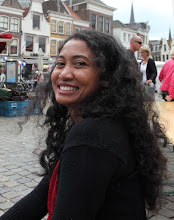Dear W,
It's almost weekend. What's your plans this weekend? Hope you'll have great weekend with G.
I also hope the same for everyone :)
Today, I'll try to finish a roman-Indisch novel which was written by a well-known Indonesian writer, Pramoedya Ananta Toer. He once wrote four novels which were called "The Buru Quartet". Footsteps is the third volume of novels inspired by the life of one of the pioneers of the Indonesian awakening and of Indonesian journalism, Tirto Adi Suryo (Introduction, p. 9). Others novels are: Bumi Manusia (This Earth of Mankind)-first volume, Anak Semua Bangsa (Child of All Nations)-second volume, and Rumah Kaca (The Glass House)-fourth volume.
I borrowed this book from Erasmus Huis Library.
 |
| Book cover, english version published by Penguin Source: Internet |
Well, while I have been reading this novel of Jejak Langkah (Footsteps), I found some words which-perhaps it's not important things :p-are not really related to the main idea of the story. I called them as some little issues. Here they are! :)
" Betawi was not as busy as Surabaya. And so clean. Big wooden rubbish bins stood in apporiate places and the people placed their garbage there. Not like Surabaya. And there were little parks everywhere, their brightly colored flowers adding a touch of festivity." (p.17-18)
 |
| Source: Internet |
" In Surabaya all you ever saw were bamboo-hut slums and fires, and rubbish everywhere." (p.18)
 |
| Source: Internet |
"It was the same with the Europeans. Once they arrived here they were forced to take concubines. But the Dutch were also known to be really stingy. They wanted to return to Holland as wealthy people. So many of them didn't want to take concubines. As replacement for a mistress, they made the guling-a mistress that can't fart. Hey, you, Kleooo-have you ever come across a mention of the guling in any of javanese literature you have read? No, you haven't. And you, Sutan, what about in Malay literature? A big zero. It just didn't exist. It was a pure Dutch invention-the mistress that doesn't fart-'A Dutch Wife.'..." (p.54)
 |
| Source: Internet |
"....The two of us swung around to face the street. There appeared a big four-wheeled box, which stopped in front of the house.
"An automobile!" I shouted exactly.
Immediately we both descended the front steps and headed for the horseless carriage. But before we made it to the gate, the car was surrounded by people. It was shaped like normal carriage, except there were no horses. It's wheels were made from wood. It's hood was folded back. Smoke and dust were still spewing out of the back." (p.221)
 |
| Source: Personal Collection, taken from A Train Exhibition @Erasmus Huis, Jakarta, 2013 |
" He asks for smaller print. He is a true Dutchman, not a native. He does not know that the natives cannot afford to buy spectacles. Many Priyayi are forced to retire at forty-five and cannot afford to buy them." (p.241)
 |
| Source: Internet |
" "Three strong teas, please! Will the chicken be long?"
"Maybe another hour, Ndoro." " (p.283)
" He left and straightaway the grilled chicken arrived, golden brown and glistening in oily kecap. And out of the holes left by the skewers wafted the most mouthwatering smell, an aroma more wondrous than could ever come from any incense." (p.287)
" And three chickens, which two hours before had still been running about on their own two feet, still tidying up their ruffled feathers, still competing with their fellow roosters, now dissappeared, destroyed, dissoveld in our mouths among the glistening kecap and saliva, then to descend our throats to meet the waiting worms in our stomachs." (p. 289)
 |
| Source: Internet |
"...Shoes are nothing but a means to protect your feet from broken glass, sharp stones, and dog shit. Wearing shoes is not the same thing as becoming European or Christian. They are not symbol of how close you are to Dutch authorities, so the native rulers do not need to be offended and infuriated when they see another Native wearing shoes...." (p. 348)
"...the shoe shops were besieged by young people wanting to buy shoes. And so Bandung was full of youths defiantly striding the streets in their new shoes,..." (p.349)
 |
| Source: Internet |
Hmm, so those 'nowadays things' for us in this modern era were not such ordinary ones in the past of Indisch: the condition, the way people see it, the process, etc. For me, those little issues I rewrote above are some unique description which made me smile a bit when visualized them in my mind.
Time to continue reading the last pages!
Hope to hear from you, W,...one day...






No comments:
Post a Comment